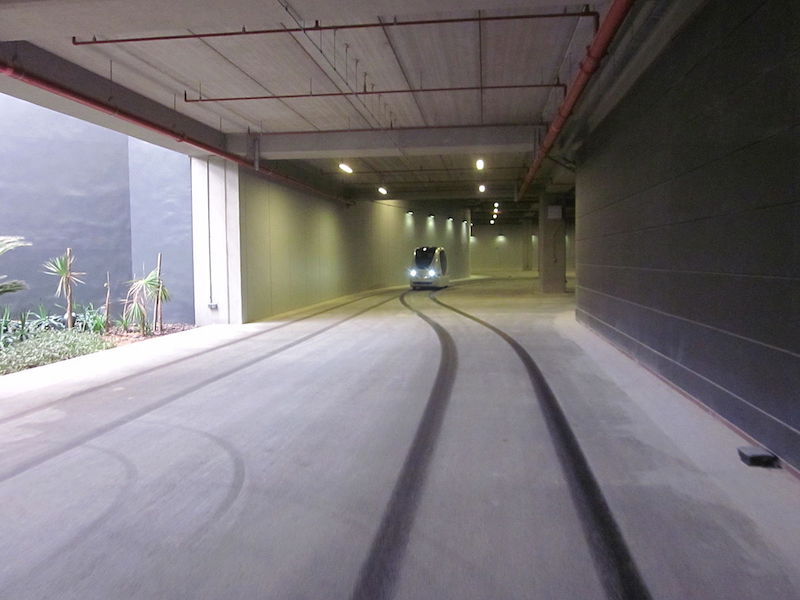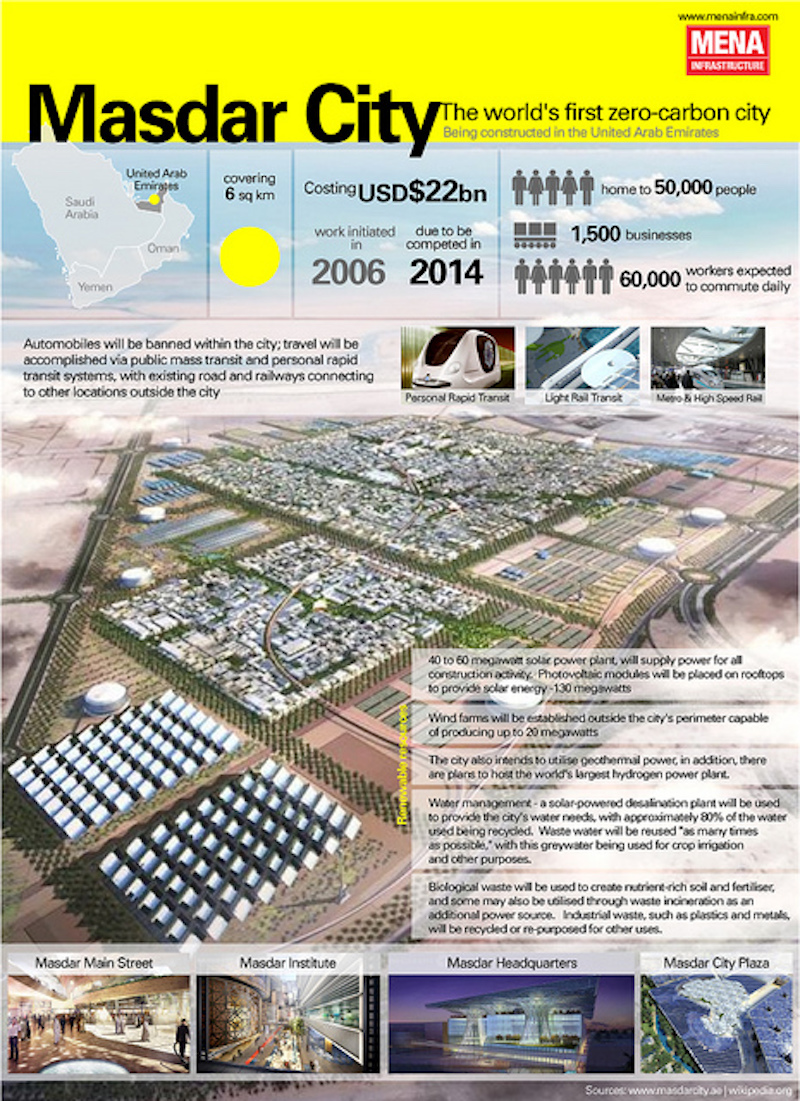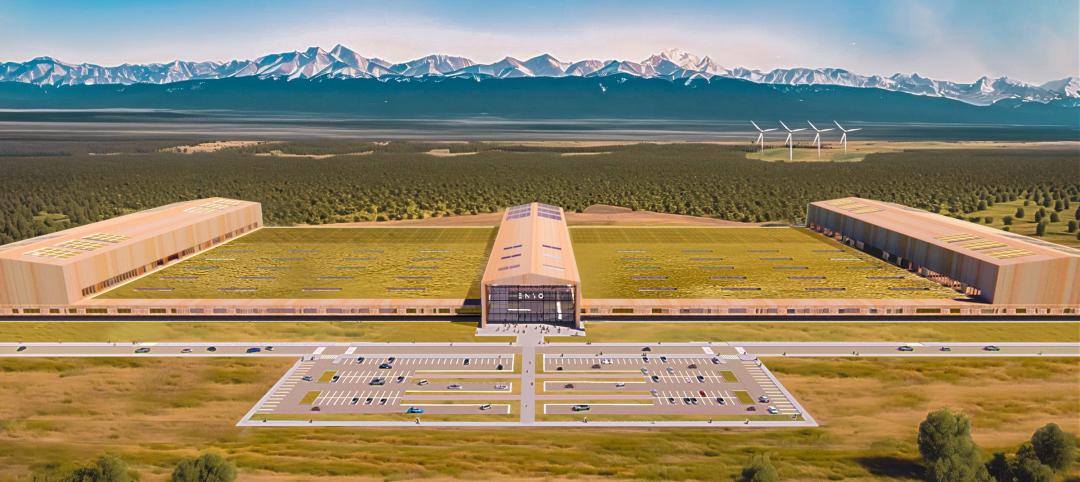Utopia. A word used to describe a place where everything is perfect. And, from an environmental standpoint, Masdar City, located just outside of the United Arab Emirates’ capital city of Abu Dhabi, was billed as a futuristic, green city that was supposed to be an environmentalist’s utopia.
Ten years ago, Masdar City was the model for a green city, one that would reach net-zero standards, not just for a few of its major buildings, but for the city as a whole. But, as the Scottish poet Robert Burns wrote, "the best laid schemes of mice and men often go awry." Now, Masdar City looks more like a movie set after filming has wrapped or an abandoned Olympic venue of the past than a Jetsons-esque city of the future.
In short, as The Guardian’s Suzanne Goldenberg reports, Masdar City is closer to becoming the world’s first green ghost town than it is to becoming the world’s first net-zero city. The city's completion date was 2016, but that goal is no longer attainable (the new completion date has been pushed back to 2030). Neither is the goal of becoming a net-zero city. Even though, as it currently stands, only about 5% of the original six square kilometer building area has been developed, the city is already unable to keep up with the demand of being truly net-zero. In fact, it’s at about 50% of that.
In 2006, before the hype surrounding Masdar City plummeted back to earth, the project was heralded as a future global hub for the cleantech industry. Developers expected 50,000 permanent residents and 40,000 commuters zipping around the futuristic city via driverless electric cars from one efficient and green building to the next.
In 2016, there are only 300 permanent residents of Masdar City, all of whom are graduate students at the Masdar Institute of Science and Technology and, according to tour guides, fewer than 2,000 people work on campus.
There are around 300 firms with an official presence in Masdar City, but the buildings still, for the most part, remain empty. For example, the International Renewable Energy Agency is headquartered in a state-of-the-art six-story building that manages to use only one-third of the energy as compared to other buildings in Abu Dhabi. But the majority of this six-story structure remains vacant; only around 90 employees actually work in the building.
Other parts of the city act as a museum of half-baked ideas; a 100-station-long autonomous transport system was halted after the first two stops, due in large part to the speedy rise of the electric car. A bike sharing station is in place and ready to use, but it's 10 miles away from Abu Dhabi, which would feel like an even longer trek thanks to the complete lack of bike paths.
 Masdar City's initial design called for automobiles to be banned. Instead, a public transport system using Personal Rapid Transit pods (pictured) would shuttle people around the city. The rise of the electric car made this system an unnecessary expense. Photo: Jan Seifert, Wikimedia Commons
Masdar City's initial design called for automobiles to be banned. Instead, a public transport system using Personal Rapid Transit pods (pictured) would shuttle people around the city. The rise of the electric car made this system an unnecessary expense. Photo: Jan Seifert, Wikimedia Commons
It certainly didn’t help matters that crews broke ground on Masdar City in 2008, just as the global recession was about to kick into high gear. According to Chris Wan, the Design Manager for Masdar City, the recession made the decision of whether or not to invest in Masdar City much easier for many who were contemplating the idea. Ultimately, they decided to just play it safe and watch from the sidelines.
However, Masdar isn’t a complete failure. Sure, it will not reach its goals of being net-zero, but that doesn’t mean the city isn’t much more efficient than a typical city. Airtight insulation, high-efficiency elevators, designs that prefer natural lighting to artificial lighting, and solar water heaters on the roofs of many buildings all optimize energy use and make these buildings more efficient.
The city is still evolving and still has some lofty goals for what it can become upon completion. Until then, it can only be judged on what it currently is: a city of ideas.
 Image Credit: GDS Infographics, Flickr Creative Commons
Image Credit: GDS Infographics, Flickr Creative Commons
Related Stories
Sustainable Design and Construction | Oct 10, 2024
Northglenn, a Denver suburb, opens a net zero, all-electric city hall with a mass timber structure
Northglenn, Colo., a Denver suburb, has opened the new Northglenn City Hall—a net zero, fully electric building with a mass timber structure. The 32,600-sf, $33.7 million building houses 60 city staffers. Designed by Anderson Mason Dale Architects, Northglenn City Hall is set to become the first municipal building in Colorado, and one of the first in the country, to achieve the Core certification: a green building rating system overseen by the International Living Future Institute.
Office Buildings | Sep 6, 2024
Fact sheet outlines benefits, challenges of thermal energy storage for commercial buildings
A U.S. Dept. of Energy document discusses the benefits and challenges of thermal energy storage for commercial buildings. The document explains how the various types of thermal energy storage technologies work, where their installation is most beneficial, and some practical considerations around installations.
Industrial Facilities | Aug 28, 2024
UK-based tire company plans to build the first carbon-neutral tire factory in the U.S.
ENSO, a U.K.-based company that makes tires for electric vehicles, has announced plans to build the first carbon-neutral tire factory in the U.S. The $500 million ENSO technology campus will be powered entirely by renewable energy. The first-of-its-kind tire factory aims to be carbon neutral without purchased offsets, using carbon-neutral raw materials and building materials.
Government Buildings | Aug 19, 2024
GSA posts new RFI for enabling energy efficiency, decarbonization in commercial buildings
The U.S. General Services Administration (GSA), in collaboration with the U.S. Department of Energy, recently released a new Request For Information (RFI) focused on enabling energy efficiency and decarbonization in commercial buildings. GSA wants to test innovative technologies through GSA’s Center for Emerging Building Technologies.
Adaptive Reuse | Aug 14, 2024
KPF unveils design for repositioning of Norman Foster’s 8 Canada Square tower in London
8 Canada Square, a Norman Foster-designed office building that’s currently the global headquarters of HSBC Holdings, will have large sections of its façade removed to create landscaped terraces. The project, designed by KPF, will be the world’s largest transformation of an office tower into a sustainable mixed-use building.
Sustainability | Aug 14, 2024
World’s first TRUE Zero Waste for Construction-certified public project delivered in Calif.
The Contra Costa County Administration Building in Martinez, Calif., is the world’s first public project to achieve the zero-waste-focused TRUE Gold certification for construction. The TRUE Certification for Construction program, administered by Green Business Certification Inc. (GBCI), recognizes projects that achieve exceptional levels of waste reduction, reuse, and recycling.
Energy Efficiency | Aug 9, 2024
Artificial intelligence could help reduce energy consumption by as much as 40% by 2050
Artificial intelligence could help U.S. buildings to significantly reduce energy consumption and carbon emissions, according to a paper by researchers at the Lawrence Berkeley National Laboratory.
Green | Aug 7, 2024
Major cities worldwide set building performance standards
Cities around the world are setting building performance standards (BPS) as a key measure to cut emissions and meet climate targets, according to a report from JLL.
Smart Buildings | Jul 25, 2024
A Swiss startup devises an intelligent photovoltaic façade that tracks and moves with the sun
Zurich Soft Robotics says Solskin can reduce building energy consumption by up to 80% while producing up to 40% more electricity than comparable façade systems.
Sustainability | Jul 18, 2024
Grimshaw launches free online tool to help accelerate decarbonization of buildings
Minoro, an online platform to help accelerate the decarbonization of buildings, was recently launched by architecture firm Grimshaw, in collaboration with more than 20 supporting organizations including World Business Council for Sustainable Development (WBCSD), RIBA, Architecture 2030, the World Green Building Council (WorldGBC) and several national Green Building Councils from across the globe.

















